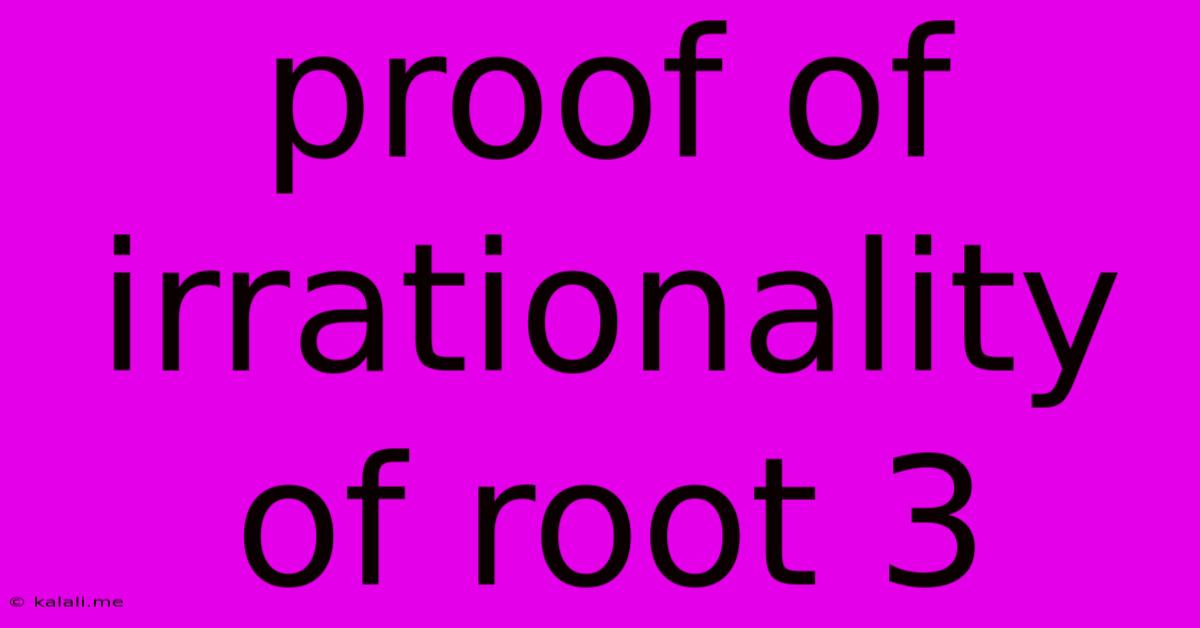Proof Of Irrationality Of Root 3
Kalali
May 19, 2025 · 3 min read

Table of Contents
Proving the Irrationality of √3: A Comprehensive Guide
Meta Description: Learn how to prove the irrationality of the square root of 3 using the method of proof by contradiction. This guide provides a step-by-step explanation, making this mathematical concept accessible to everyone.
The square root of 3 (√3) is an irrational number. This means it cannot be expressed as a fraction p/q, where p and q are integers and q is not zero. Understanding why this is true involves a classic mathematical proof technique: proof by contradiction. Let's delve into a clear and concise explanation.
Understanding Irrational Numbers
Before we begin the proof, let's clarify what irrational numbers are. Rational numbers can be expressed as a ratio of two integers. Examples include 1/2, 3/4, and even -5 (which can be written as -5/1). Irrational numbers, on the other hand, cannot be expressed as such a ratio. They have decimal representations that neither terminate nor repeat. Famous examples include π (pi) and e (Euler's number), and, as we'll prove, √3.
Proof by Contradiction: The Strategy
Proof by contradiction is a powerful method in mathematics. It works by assuming the opposite of what we want to prove and then showing that this assumption leads to a contradiction. If the assumption leads to a contradiction, it must be false, and therefore the original statement must be true.
Proving the Irrationality of √3
Let's assume, for the sake of contradiction, that √3 is rational. This means it can be expressed as a fraction p/q, where p and q are integers, q ≠ 0, and p and q are in their simplest form (meaning they share no common factors other than 1). This is crucial to our proof.
-
Assumption: √3 = p/q (where p and q are integers, q ≠ 0, and p and q are coprime – they share no common factors).
-
Squaring both sides: Squaring both sides of the equation, we get: 3 = p²/q²
-
Rearranging the equation: Multiplying both sides by q², we obtain: 3q² = p²
-
Deduction about p: This equation tells us that p² is a multiple of 3. Since 3 is a prime number, this implies that p itself must also be a multiple of 3. We can express this as p = 3k, where k is an integer.
-
Substituting and simplifying: Substitute p = 3k into the equation 3q² = p²: 3q² = (3k)² = 9k²
-
Further simplification: Dividing both sides by 3, we get: q² = 3k²
-
Deduction about q: This equation shows that q² is also a multiple of 3. Again, since 3 is prime, this means q must be a multiple of 3.
-
The Contradiction: We've now shown that both p and q are multiples of 3. But this contradicts our initial assumption that p and q are coprime (share no common factors). Our assumption that √3 is rational has led to a contradiction.
-
Conclusion: Therefore, our initial assumption must be false. Hence, √3 is irrational.
Further Exploration
This proof demonstrates the elegance and power of proof by contradiction. The same technique can be used to prove the irrationality of other numbers, such as √2 and √5. Understanding this proof provides a strong foundation for further explorations in number theory and higher-level mathematics. The key takeaway is the careful manipulation of the equation and the understanding of prime factorization to arrive at the crucial contradiction.
Latest Posts
Latest Posts
-
How To Say As In French
May 19, 2025
-
Show That Root 3 Is Irrational
May 19, 2025
-
Who Is The Author Of Genesis
May 19, 2025
-
Can You Park On A Single White Line
May 19, 2025
-
Can You Not Pray For 40 Days After Snorting Noise
May 19, 2025
Related Post
Thank you for visiting our website which covers about Proof Of Irrationality Of Root 3 . We hope the information provided has been useful to you. Feel free to contact us if you have any questions or need further assistance. See you next time and don't miss to bookmark.